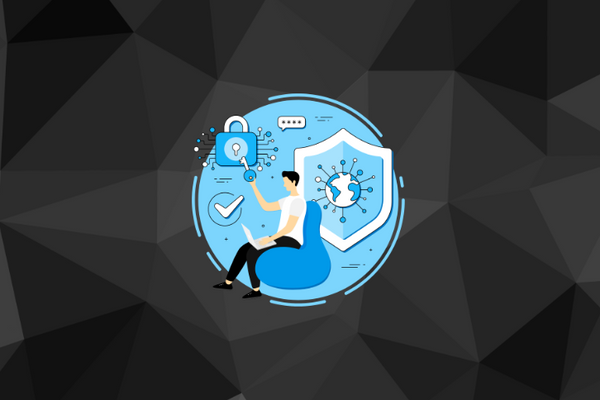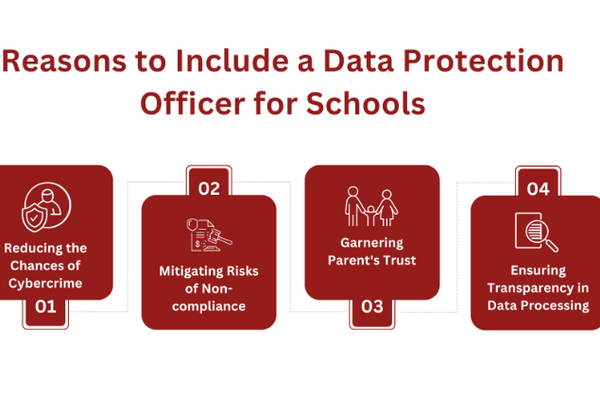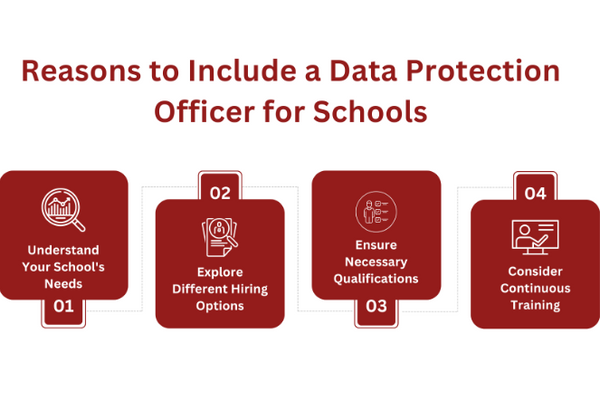
In the digital age, the importance of a data protection officer for schools cannot be overstated.
With educational institutions housing personal information on both students and staff, ensuring this data is handled with the utmost care becomes paramount.
This guide sheds light on the pivotal role of the data protection officer within schools, the need for compliance with the GDPR, and insight into the dynamics of data security within the educational sector.
Through this journey, we’ll delve into how schools can uphold data protection standards, ensuring the safety of student and employee data. Let’s get started.
Key Takeaways
Schools handle a lot of sensitive personal data, making a dedicated Data Protection Officer essential (and in some cases legally required) for ensuring compliance with the GDPR and safeguarding both student and employee data.
Hiring a DPO is not just a compliance measure; it strengthens trust, boosts transparency, and mitigates risks associated with cybercrimes and potentially hefty fines.
Various hiring options exist for schools, from in-house to DPOaaS, but ensuring the chosen DPO has the expertise and continuous training is paramount for adapting to evolving data protection norms.
What Do Data Protection Officers Do for Schools?
Screenshot 2023-09-10 094143.png

DPOs manage the data for the data controller (the school). Their primary duty is to ensure that schools process the personal data of students, staff, and other consumers in compliance with the GDPR and other relevant data protection regulations.
The importance of this role becomes evident when you consider the vast amount of sensitive information, from academic records to special education needs, that schools handle daily. A DPO’s responsibilities extend beyond mere compliance.
They act as the mediator between the school and any relevant supervisory authorities, ensuring that all data processing activities align with established guidelines.
In the unfortunate event of a data breach, the DPO is responsible for notifying the concerned parties and managing the crisis. Furthermore, DPOs provide necessary guidance to schools on data protection best practices. They may offer training to staff, ensuring everyone is aware of how to handle personal data correctly.
With the rising threat of cyber security issues, having a dedicated individual overseeing data protection has become essential for schools. While many schools might consider hiring a full-time DPO, others could choose to outsource data protection officer services, often referred to as DPO as a service.
This flexibility ensures that all schools, regardless of their size or resources, can maintain data protection compliance, safeguarding both student and employee data.
Are Data Protection Officers Important for Schools?
The significance of data protection in schools is undeniable. Schools handle tons of personal data, encompassing both students and staff. This data can include sensitive information related to health, family background, special education needs, and more.
The mishandling of this data not only breaches the trust of consumers but can also lead to severe penalties under the GDPR. The question isn’t just whether schools need a DPO, but rather how they can afford not to have one.
The financial repercussions of such breaches can be crippling. Under the GDPR, non-compliance can lead to fines of up to €20 million or 4% of the entities’ global turnover, whichever is higher. For many educational institutions, these penalties would be devastating.
Moreover, beyond the financial implications, schools need to consider their reputation. In an era where consumers are increasingly concerned about their personal data’s safety, a breach could cause irreparable damage to a school’s image.
Parents and guardians want to trust that their child’s data is safe, and staff members expect their employee data to be handled with care.
Given the potential penalties and reputational risks at stake, the investment in a Data Protection Officer is worth it.
Reasons to Include a Data Protection Officer for Schools
Screenshot 2023-09-10 094205.png

A data protection officer’s presence isn’t just about compliance, it’s about forging trust, ensuring transparency, and safeguarding against potential threats.
Here are the reasons why schools should consider incorporating a DPO into their infrastructure:
Reducing the Chances of Cybercrime
In an age where cyber-attacks are becoming increasingly sophisticated, schools, with their vast reservoirs of personal data, can be prime targets. A DPO is trained to understand the intricacies of cyber security and is instrumental in implementing measures to protect schools from potential threats.
By regularly updating security protocols and ensuring staff are adequately trained, they can significantly diminish the chances of data breaches and cybercrimes.
Mitigating Risks of Non-compliance
With ever-evolving data protection laws, like the GDPR and CPRA, staying compliant can be challenging.However, it doesn’t have to be challenging. A DPO’s expertise lies in their deep understanding of these laws and their ability to implement them within the institution.
They act as a bridge between regulatory bodies and the school, ensuring that all data processing activities are in line with the law. This not only reduces the chances of non-compliance but also shields the school from potential hefty fines.
Garnering Parent’s Trust
Parents entrust schools with their children’s personal data, expecting it to be safeguarded with the utmost care.
Having a dedicated DPO sends a clear message to parents that the school is proactive about data protection. This fosters a sense of trust and reassurance among parents, knowing that an expert is protecting their child’s data.
Ensuring Transparency in Data Processing
Transparency is pivotal in today’s data-driven world. Consumers have the right to know how their data is being used, stored, and protected. A DPO ensures that schools maintain a transparent system where all data processing activities are documented and accessible.
They can also facilitate data subject requests, ensuring that individuals can easily access, modify, or delete their personal data if they wish.
How to Hire a Data Protection Officer for Schools
Screenshot 2023-09-10 094228.png

Navigating the realm of data protection can be complex, but with the right Data Protection Officer (DPO) by your side, schools can confidently traverse this landscape. However, the process of hiring the right DPO isn’t just about checking off a compliance box.
It involves careful consideration of qualifications, understanding the school’s specific needs, and exploring various hiring avenues. Here’s what you should consider when hiring a data protection officer for schools:
Understand Your School’s Needs
Before embarking on the hiring process, it’s essential to evaluate the specific needs of your school. Consider factors like the size of the institution, the volume of personal data being processed, and the complexity of the data systems in place.
For instance, larger schools or institutions handling sensitive special education data might require a DPO with more specialized expertise.
Explore Different Hiring Options
There are several routes schools can take when hiring a DPO:
In-house Hiring: Some schools may find it beneficial to hire an internal DPO, especially if there’s already a staff member with data protection expertise. This is a great option for larger schools.
DPO as a Service (DPOaaS): For schools that may not have the resources or the need for a full-time DPO, outsourcing this role can be an optimal solution. This option offers flexibility and ensures expert guidance without long-term commitment.
Shared DPO: Smaller institutions might consider sharing a DPO with neighboring schools, ensuring compliance while optimizing costs.
Ensure Necessary Qualifications and Expertise
A DPO’s role is pivotal, and as such, they should possess a certain skill set. When hiring, ensure they have:
A deep understanding of the GDPR and other relevant data protection regulations.
Experience in data protection compliance and handling data breaches.
A grasp of cyber security best practices.
Strong communication skills with both staff and external service providers.
An ability to provide and facilitate training sessions for school staff.
Consider Continuous Training and Development
Data protection norms and cyber threats are constantly evolving. As such, even after hiring a DPO, schools should invest in their continuous training and development. This ensures that the DPO stays updated with the latest in data protection, offering the school the most current and effective guidance.
Closing
Data protection in schools is not just about compliance; it’s about trust, transparency, and the safety of personal data.
While understanding is the first step, action is what matters. Captain Compliance specializes in compliance solutions, and can be your guiding light if you’re wondering how you can ensure your organization is compliant.
Offering expertise in data compliance services and corporate compliance, we’re ready to assist schools in their data protection journey.
Act Now! Ensure your school’s data protection with us. Contact us and let’s navigate the data privacy landscape together, ensuring a safer and more compliant environment for your institution.
FAQs
Do independent schools need a data protection officer?
Yes, independent schools, just like state schools, are required to have a data protection officer if they process personal data on a large scale or deal with special categories of data.
Given the nature of the data schools handle (e.g., student records, health information), having a DPO is crucial for compliance with the GDPR and ensuring data safety.
Need to Appoint a DPO? Contact us for help!
How much do data protection officers cost?
The cost of hiring a data protection officer varies depending on several factors, including the officer’s experience, the complexity of the school’s data processing activities, and whether the role is in-house, outsourced, or shared with other institutions. On average, a DPO’s salary can range from £30,000 to over £70,000 in the UK.
Curious about the costs of data protection officers? Find out more here!
How often should schools review their data protection practices?
It’s advisable for schools to review their data protection practices at least annually or whenever significant changes occur, such as introducing new systems or processes.
Regular reviews, ideally overseen by the DPO, ensure that schools remain compliant and adapt to evolving data protection norms.
Stay Updated with Best Practices in Data Protection. Explore Our Resources!
Can a single DPO serve multiple schools or educational institutions?
Yes, particularly for smaller schools or institutions with similar data processing activities, it can be feasible and cost-effective to share a DPO. This approach ensures compliance while optimizing costs, but the DPO must have the capacity to adequately serve all institutions involved.
Discover the Benefits of Shared DPO Services in Our Latest Article!
Who can be a data protection officer for the school?
A data protection officer for a school can be someone already within the institution, provided they have the necessary expertise and can perform their duties without any conflicts of interest. Schools can also hire externally, share a DPO with other institutions, or use DPOaaS.